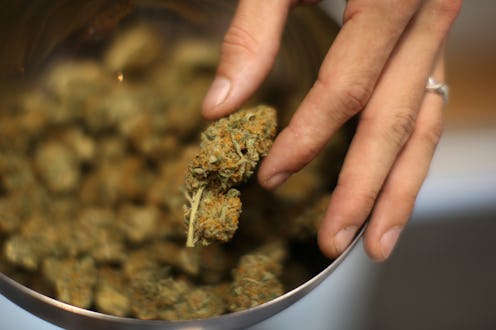Cannabis is still an illegal, Class B drug in the United Kingdom — possession could result in up to five years in prison — but U.K. citizens are drawing inspiration from U.S. states like Colorado in their fight for drug reform. In February, a British political party called Cannabis is Safer than Alcohol (CISTA) formed and echoed the economic benefits that Colorado has enjoyed, benefits like job production and increases in tax revenue. If marijuana has all of these benefits and is potentially safer than alcohol, why isn't weed legal in the U.K. yet?
CISTA, which officially registered in March, promoted the legalization, regulation, and taxation of cannabis because of its economic benefits. According to The Independent, legal marijuana could raise £900 million ($1.4 billion) and cut the national deficit by £1.25 billion ($1.9 billion). CISTA also said the "war on drugs" only served to drive underground production and sales. Last summer also saw the creation of the United Patients Alliance (UPA), an organization founded by multiple sclerosis patient Clark French to combat the criminalization of people who use cannabis to treat their illnesses.
But the U.K. has shown growing resistance to legal weed. Marijuana was re-promoted to Class B status in 2009 after a five-year stint in the less harmful Class C level. A study conducted last year showed a record number of children were receiving treatment for addiction to cannabis, despite the rate of total use going down. This information came to light just before delegates of the British Medical Association met at an annual conference to debate the legalization of the drug. The BMA ultimately voted to reject the legalization of cannabis, choosing instead to recommend a ban on millennials smoking cigarettes.
In October 2014, Prime Minister David Cameron — who had called for more liberal drug laws back in 2005 — actually expressed opposition to a change in U.K. drug policy following a Home Office-commissioned report that did not find a link between tough enforcement and lower drug use. In a speech, Cameron argued that drug use under his administration was indeed decreasing, but did not elaborate on the growing difficulties people faced when trying to access high-quality drug treatment.
I don’t believe in decriminalizing drugs that are illegal today. I’m a parent with three children. I don’t want to send out a message that somehow taking these drugs is OK or safe.
Another question about cannabis in the U.K. rose during debates about Scottish independence last fall. Would an independent Scotland take a different stance on drugs? Professor David Nutt, of Imperial College London's medical department, has been particularly active in this arena, writing the book Drugs Without The Hot Air and establishing a new research body. In September 2014, he told VICE writer Liam Turbett, “The U.K. government is the only one in the world to have taken backwards steps on drugs control in the last decade — the opposite of, say, the USA. A free Scotland could be more sensible and reverse this regressive trend.” Worth noting however, Nutt was fired from his position as chair of the Advisory Council for Misuse of Drugs in 2009 after claiming marijuana, ecstasy, and LSD were less dangerous than alcohol and tobacco.
Of course, the referendum for Scottish independence did not pass, but it did bring attention to differences between Scotland and England in regards to viewpoints on the decriminalization of cannabis. It doesn't look like the U.K. is eager to legalize weed, and the debates on the subject have grown more numerous and intense in the past couple years. But it's possible that eventually CISTA and the UPA, among other pro-drug reform organizations, will be able to sway public and political opinion in favor of legalization and decriminalization.
Images: Getty Images (2)
